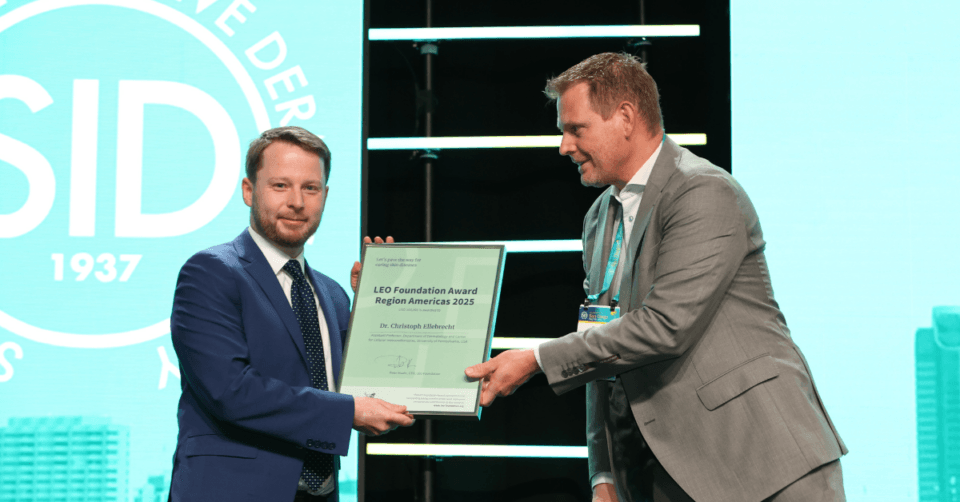Dr. Christoph Ellebrecht was presented with the award on stage at the SID Annual Meeting last week by Lars Kruse, Senior Scientific Officer at the LEO Foundation.
14 May 2025
The 2025 award recognizes Dr. Christoph Ellebrecht for his scientific contributions to our understanding of T cell biology in the skin and its diseases.
Dr. Christoph Ellebrecht, Assistant Professor in the Department of Dermatology and the Center for Cellular Immunotherapies at the University of Pennsylvania, has been awarded the 2025 LEO Foundation Award – Region Americas. Presented on stage at the SID Annual Meeting in San Diego, the award recognizes outstanding young skin researchers.
“Receiving the LEO Foundation Award is an immense honor and incredibly motivating,” says Dr. Christoph Ellebrecht.
“It not only recognizes the efforts and innovations from my laboratory but also highlights the importance of basic and translational skin research. This award will further inspire me and my team to keep asking bold questions, pushing boundaries, and pursuing discoveries that meaningfully improve patient care,” he says.
Skin is a dynamic and interactive immune environment
Christoph Ellebrecht’s research focuses on understanding human T cell biology – specifically how T cells make decisions that influence their fate, persistence, and function within tissues. Through advanced cellular engineering, genome editing, and single-cell multiomics, his research investigates the mechanisms underlying T cell differentiation and how these processes can be leveraged therapeutically in autoimmune diseases, inflammatory skin conditions, and cancer.
His scientific interest is rooted in his fascination with the skin as a uniquely dynamic and interactive immune environment.
“The skin fascinates me because it represents an incredibly complex immunological environment where diverse cell types constantly interact and adapt to external stimuli. It serves as both a barrier and an active immunological interface, reflecting systemic health and disease. Understanding how immune cells, especially T cells, integrate signals in the skin to adapt and persist provides unique insights into both normal physiology and the pathogenesis of skin disorders,” he says.
About the LEO Foundation Awards
The LEO Foundation Award – worth USD 100,000 – recognizes outstanding young researchers and scientists from around the world whose work represents an extraordinary contribution to skin research and has the potential to pave the way for new and improved treatments for skin diseases.
The award is given three times annually, one in each of the three regions: the Americas, EMEA and Asia-Pacific. It is granted in open competition with all award applications being evaluated by an independent and international Global Review Panel. The panel members are appointed annually by their respective dermatology societies in the three regions.
